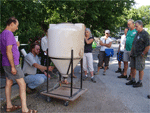Five years have passed since 2008 when the last Farm Bill was implemented and while it was largely geared towards supporting industrial agriculture, progress was made to add new provisions that supported local and regional food systems in the United States. But like every Farm Bill, this one came with an expiration date of September 30th, 2012 and when Congress failed to agree on a new Farm Bill before that date (no surprise here) the bill was extended, returning the bill to it's permanent legislation and erasing those new provisions supporting healthy food and farms. Battle lost.
That is why supporting the Local Farms, Food, and Jobs Act is so important. It is a proposal to improve the upcoming 2013 Farm Bill and implement legislation that will allow for greater sustainable production of fruits, vegetables, and meats, expand access to healthy foods to consumers, and further improve the infrastructure and markets of regional and local food systems.
The Union of Concerned Scientists is one of the many organizations that is supporting this Act and is providing ways for you to take action as well. You can click here to show your support and tell Congress to cosponsor the Local Farms, Food, and Jobs Act of 2013!
Best,
Katie









